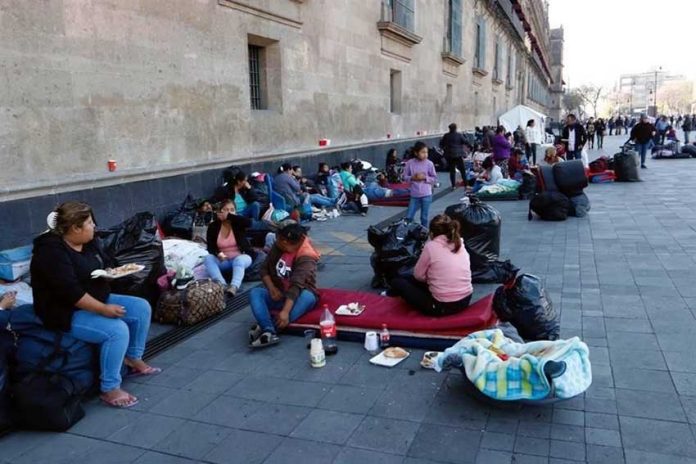Displaced families from Guerrero and oil workers from Gulf of Mexico states are among hundreds of people protesting in front of the National Palace in Mexico City today.
More than 400 people displaced by violence in the Guerrero municipalities of Leonardo Bravo and Zitlala traveled to the capital yesterday in buses and pickup trucks and camped out in front of the seat of executive power, located in Mexico City’s downtown.
The residents are demanding a meeting with President López Obrador to seek his assistance to return home or to be relocated elsewhere.
Cresencio Pacheco González, spokesman for the displaced people, told the newspaper El Universal that Guerrero Governor Héctor Astudillo Flores hasn’t shown any interest in resolving their problem.
Those displaced from Leonardo Bravo, an opium-poppy growing municipality in the state’s sierra region, left their homes on November 11 after around 2,000 armed men – self-declared community police members – took control of 10 communities.
More than 1,600 people have since stayed in crowded conditions in an auditorium in the municipal seat of Chichihualco.
The other group of displaced persons currently in the capital left their homes in Tlatempana, Zitlala, on November 8 after receiving threats from self-defense force members who have controlled the town for four years.
The same self-defense force has been engaged in a dispute with another vigilante group from the municipality of Chilapa. The dispute left 12 people dead last month.
The Zitlala residents say it is impossible for them to return home while the violence continues.
Joining the Guerrero residents in central Mexico City are Pemex employees from the states of Veracruz, Tabasco and Campeche.
The members of Section 47 of the Petroleum Workers’ Union are protesting at the entrance of the National Palace to denounce the sale of positions within the state oil company and to demand the full payment of their salaries.
In addition, members of the indigenous Triqui community, a group originally from Oaxaca, are staging a sit-in to demand they be given a space in the capital to sell their arts and crafts.
Shortly after López Obrador took office on December 1, metal barricades that prevented citizens from getting close to the National Palace were removed.
In the ensuing two and a half months, scores of different groups, organizations and individuals with a range of different complaints and petitions have staged protests within what they hope is the president’s earshot.
Before he took power, hundreds of people arrived daily at López Obrador’s transitional headquarters in the Mexico City neighborhood of Roma to ask for the then president-elect’s assistance to cure all manner of ills and wrongdoings, underscoring the staunch faith many Mexicans have in the political veteran.
Source: El Universal (sp), Milenio (sp)
